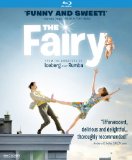| Reviews & Columns |
|
Reviews DVD TV on DVD Blu-ray 4K UHD International DVDs In Theaters Reviews by Studio Video Games Features Collector Series DVDs Easter Egg Database Interviews DVD Talk Radio Feature Articles Columns Anime Talk DVD Savant Horror DVDs The M.O.D. Squad Art House HD Talk Silent DVD
|
DVD Talk Forum |
|
|
| Resources |
|
DVD Price Search Customer Service #'s RCE Info Links |
|
Columns
|
|
|
Fairy, The
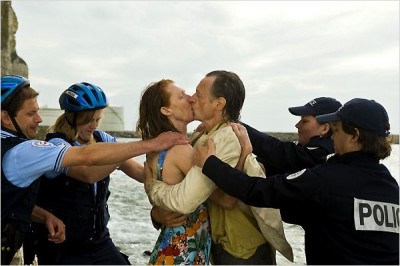
Please Note: The images used here are promotional stills provided by MK2 and are not taken from the Blu-ray edition under review.
The Fairy (La Fée) is the third film by a trio of French filmmakers -- Dominique Abel, Fiona Gordon, and Bruno Romy -- who are old-fashioned in the best possible sense. The Fairy could accurately be described as a romantic comedy, but as in the films where Chaplin (City Lights), Keaton (Seven Chances), or Jacques Tati (Playtime) force a rigid, "practical" world to bend to their humanity, overcoming it somehow to get the girl or at least retain their sanity, it's much more romantic, and much funnier, than most anything else contemporary that draws the romantic-comedy descriptor by default. I'm sorry to say that I hadn't heard of Abel, Gordon, and Romy until now, but if their first two pictures (Rumba and L'Iceberg, which I'm now seeking out just as fast as I can) are anything like as accomplished, nonchalantly eccentric, funny, and sweet as this one, they're a force to be reckoned with. I should admit upfront that I'm generally not a big fan of the kind of "whimsy" purveyed by Tim Burton and Terry Gilliam, which strikes me as more often than not frantic and shrill, unconvinced of the worthiness of its supposedly light and insouciant take on the world, and way overcompensating by attempting to force it (and is there anything less funny than forced whimsy?). The Fairy, on the other hand, has a genuine whimsy that emanates outward from its core, demonstrating with blissful, relaxed, beautifully choreographed assurance what it looks like when a filmmaker (or, in this case, filmmakers) believes without reservation in transforming the world through a (cinematic) act of imagination and actually has the inspiration, skill, and confidence to pull it off.
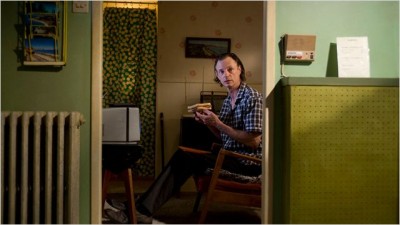
From the first shot, we're aware that bravura, beautiful but never merely ornamental, physically-comical filmmaking is what The Fairy has on tap: A long, elegant tracking shot follows alongside the hapless, middle-aged Dom (Abel) as he rides his rickety bicycle through a rainstorm to work at his dead-end job as the night porter of a little, slightly rundown hotel in a not-very-fancy quarter of town. Dom already looks ridiculous, wearing plastic bags on his feet for galoshes, another on his head, even before his bike chain gives out on him, but it's not a defeat; despite the misery, the way the scene moves and the way Abel plays it let us know that this skinny, funny-looking guy is both very accustomed to such mishaps and fully capable of deadpanning his way through and beyond them. He offers the same blasé tolerance to the evening's guests, including an English tourist (Romy) whose only French comes straight from the guidebook he's never without and who not very cleverly conspires to sneak his prohibited little dog into the hotel with him; and, more importantly, a bedraggled, skinny, rain-drenched redheaded woman, looking like some female analogue to Dom himself, sporting a dirty T-shirt and worn-out pink sweatpants. Dom has seen it all in his capacity as late-night receptionist, and he really just wants his sandwich and TV without the constant interruptions of guests, so when the woman, Fiona (Gordon), announces that she's a fairy and has come to grant him three wishes, he automatically, politely ignores it and just shows her to her room. A subsequent scene of slapstick, however, finds Dom flat on his back, tended to by the solicitous Fiona and concussed into slap-happily deigning to make the first two of his three wishes: a scooter and unlimited fuel for it.
These exceedingly modest fantasies, to Dom's (and our) surprise, are granted, and both this and the fact that he is falling in love with this dirty, mysterious angel convinces him that Fiona is magic, after all. Their whirlwind courtship involves skinny-dipping from a stony, unhospitable Le Havre beach, a subsequent undersea dance, Fiona's cartoonishly instantaneous impregnation with their child, and the most oddly, simultaneously reverent and comedic scene of childbirth ever depicted (shot in shallow focus, with Dom's slightly scraped finger and his exaggerated, preoccupied response to it in the foreground). Meanwhile, Fiona, who some seem to believe is an escaped mental patient rather than the fairy of Dom's dreams, has met an African immigrant, Fred Jr., who introduces us to the film's subplot involving Le Havre's persecuted immigrant population and who, like her, has shoplifted (he picked up a string of sausages, which he sports around his neck, for his starving co-illegals; she got a dress and shoes for her date with Dom) and is being pursued by store security guards and shopkeepers through the streets of Le Havre when their paths overlap, all adding up to yet another of the film's fluid, elegantly simple, wonderfully comic and charming sequences. (The plight of Le Havre's immigrants and its also being set in France's biggest Channel port town are only the two most prominent characteristics that make The Fairy a virtual not-quite-identical twin to Aki Kaurismäki's Le Havre).
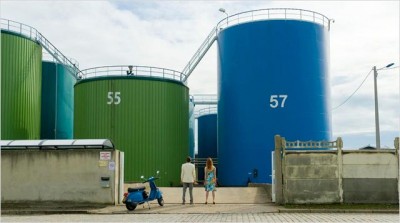
The goofily graceful modern-mating-dance waltz performed by Dom and Fiona under the sea and the fantastic one-panel-comic of her giving birth to their son (whom they give the incongruously grown-up name of "Jimmy") are only some of the strongest highlights in a never-ending, beautifully structured string of comic set pieces that use the amazing potential of the performers and the medium of film to their fullest potentials, confecting near-pure visual comedy that, like the aforementioned cinematic trinity of Chaplin, Keaton, and Tati, become something like a bittersweet but eminently humane ballet in which camera, settings, and performers all execute their simple-looking, actually very complex and demanding moves with extraordinary aplomb. By themselves, film's multiple chases -- Dom going after his runaway scooter in a long shot as they disappear and reappear from the static screen; the various flights from authorities that accrue their hilariousness by the exact, not very rapid evenness of pace maintained by both the pursuers and the pursued (the police and the shopkeepers after the innocuously shoplifting Fiona, for example, never add or decrease an inch between themselves and her, allowing Fred Jr., once he appears alongside her, to engage her in a friendly, relaxed introductory conversation in the midst of their being chased) -- are enough to make it an exemplary, generous slice of cinematic mirthmaking. That's not even counting all its other magical moments, like the sudden cut to a long shot of Dom's silhouette, in the one lit-up window on the block, during one of his extended pratfalls; or the extremely nearsighted barkeep who serves Dom and Fiona their first-date beers; or the haphazardly flying male fairy Fiona sends to Dom as an emissary; or the impromptu, heartbreaking performance of a ballad by the least delicate-looking member of a girl's soccer club who've crowded into the local pub, etc., etc.
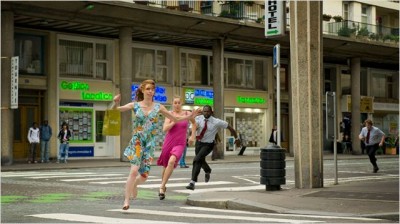
The Fairy is packed with fraught events and characters (I didn't even get to mention the hotel's English guest's tragic loss of his dog and its dovetailing with the African immigrants' need to get to the UK), but it never becomes busy, overstuffed, or claustrophobic like many wannabe-whimsical films. Its every movement, even when it moves swiftly, is both perfect and calm, ensuring a consistently light touch throughout; it must have been a backbreaking film to make, but it never lets you see it sweat. Abel, Gordon, and Romy collaborate with equal credit on all principal duties -- writing, directing, acting -- and they play and create together like very old colleagues; they're so perfectly in tune with one another, and the film is so well and fully considered and realized, you get the feeling they could probably finish each other's sentences. Working in tandem with a whole slew of special effects/CGI technicians who rightly go in for beauty and charm rather than slickness, Claire Childéric's heightened-reality cinematography (in a way similar, but more complementary than identical, to what Timo Salminen did for Le Havre), makes the ordinary, all-business, overall depressed-looking city of Le Havre into a playland for Dom and Fiona (and, eventually, Jimmy) by bringing to the fore the bold colors in the production and costume design, while the framings and compositions of the images create a sort of pleasant geometry, an open and benign urban maze in which the urgency comes not from the threats to the protagonists (which are all played for delightful comedy), but from the urgency, the staying-in-motion despite falling down, of life itself. The Fairy is a film made by serious artists, but their aim is to celebrate, with the best-suited story and lightest, happiest tone they can, the pleasures of laughter and love, and at that they succeed admirably. The film floats and enchants like some exceptionally pretty, colorful balloon, and it's so well made and motivated by such unfailing conviction, inspiration, and dedication, the only response it really allows for (while never pushing or coercing) is one of childlike delight.
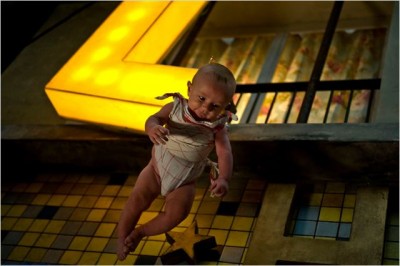
THE BLU-RAY DISC:
The picture quality is quite nice here; cinematographer Claire Childéric's particular melding of the natural light (exteriors) with the judicious use of pop-art coloring (and consequent shaping of geometrical space) added by production designers Nicolas Girauld and Benoit Valter, along with costumier Claire Dubien, all comes through very well in the image -- with solid blacks, all colors looking correct, and all skin tones natural -- on this AVC/MPEG4, 1080p transfer at an aspect ratio of 1.78:1 (altered slightly, apparently, from the film's theatrical aspect ratio of 1.85:1). Though a very smooth, composed look has been created for the film, its celluloid quality has not been mercilessly DNR'd, and the transfer retains a substantial degree of that celluloid texture that makes a film look like a film.
Sound:The vivid, rich, and deep soundtrack is brought home splendidly on the disc's DTS-HD Master Audio 5.1 track (with a 2.0 option available as well). All the dialogue; Dom's scooter; the perfectly, obsessively culled soundtrack of timeless, jazzy ballads; and 's score emerge crystal-clear and resonant, with no distortions, imbalance, or any other audio flaws.
Extras:Not much; just the film's theatrical trailer and a small stills gallery.
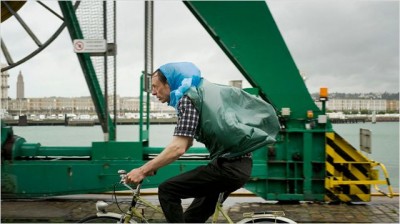
Creating and sustaining a tone of sheer, fantastical lightness and sweetness in a movie is an order just as tall as making a film of relentless gravity and seriousness, and the brilliant filmmaking trio of Dominique Abel, Fiona Gordon, and Bruno Romy have pulled it off in their third feature, The Fairy (La Fée). They simply transform the most mundane, utilitarian, or even oppressive spaces in which their characters find themselves, living downtrodden lives in a bleak port town, into the magical backdrop against which two lovable losers -- a depressive night watchman and an escaped mental patient (or is she actually the fairy of the title?) -- perform their dance of courtship, love, and family. In the tradition of the great Jacques Tati, it seems "escapist" but is not: It earns its whimsy by acknowledging the hard shapes of reality, allowing its characters to move through a cold or foreboding world empowered, because they know instinctively that it's their world as much as anyone's, and they have the imagination to see (or invent) whatever beauty it has and transcend whatever ugliness it throws their way. Likewise, in employing their own imaginations to such liberating, exhilarating effect in concocting The Fairy, Abel, Gordon, and Romy have created a cinematic experience that lets us fully participate in its characters' magical-realist view of workaday life -- not blissful ignorance, but bemused, indefatigable, and resilient open-eyed awareness. Their film is a tribute to the transformative possibilities of truly inspired, stubborn, perhaps slightly mad creativity, and it has the ability to transport us, leaving us as feeling as eccentrically uplifted and empowered as its characters, ready to take on the world's dullness and unhappiness by insisting on its possibilities for beauty and blissfulness. Highly Recommended.
|
| Popular Reviews |
| Sponsored Links |
|
|
| Sponsored Links |
|
|
| Release List | Reviews | Shop | Newsletter | Forum | DVD Giveaways | Blu-Ray | Advertise |
|
Copyright 2024 DVDTalk.com All Rights Reserved. Legal Info, Privacy Policy, Terms of Use,
Manage Preferences,
Your Privacy Choices | |||||||









